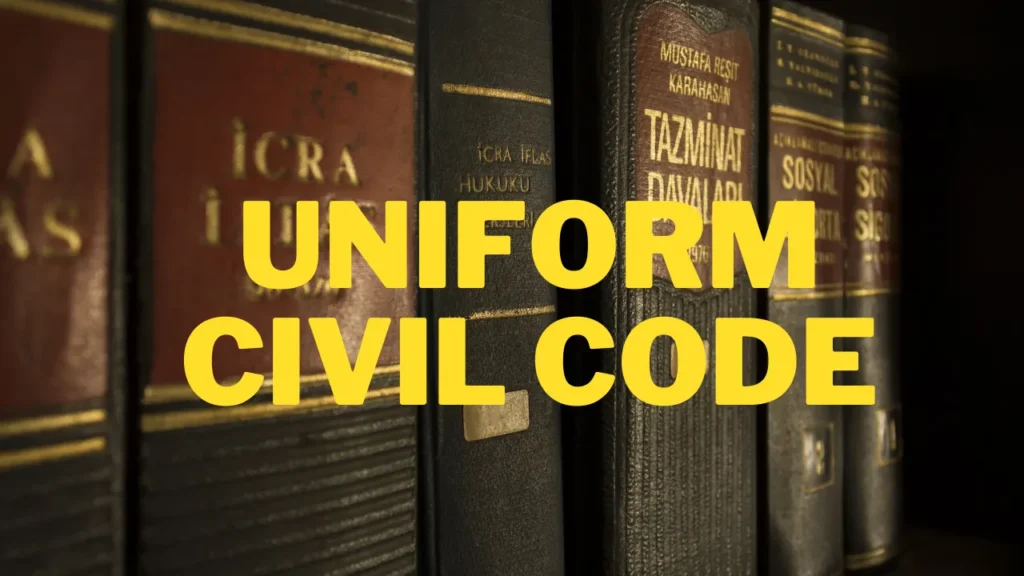In India, the quest for a Uniform Civil Code (UCC) has been a complex subject matter that intertwines with intricate issues of jurisprudence, culture, faith, and governance. The distinctive socio-cultural and religious diversity of India, coupled with its historical backdrop, has influenced its approach towards personal laws, while Turkey and Egypt present contrasting case studies with their own historical narratives. This comparative research delves into the evolution of a UCC in India, extracting enlightening perspectives from the legal frameworks of Turkey and Egypt, with the aim of comprehending the challenges, consequences, and potential insights that can be gleaned from the experiences of these nations.
Table of Contents
RESEARCH QUESTION for UNIFORM CIVIL CODE
- How have the different legal frameworks of India, Turkey, and Egypt influenced the discourse and implementation of secularism and secularization in their respective societies?
- What are the challenges India have in order to adopt a Uniform Civil Code? In what way it aligns with or diverge from the Civil Code systems in Turkey and Egypt?
BACKGROUND
India is diverse nation due to many groups with different cultural, social and religious and legal norms. Although India is a secular country, there are differences in individual rights. The concept of Uniform Civil Code is designed to settle the current debate on secularism in India. Therefore, a careful analysis is required because this concept can be interpreted in many ways. However, it is understood that the spirit of the Indian Constitution reflects the vision of Constitutional framers and the Constitution speaks about the various cultural, social attributes and religions of the Indian population.
The principles of the Uniform Civil Code are regulated in Article 44 of the Constitution. The term and its contents of the “Uniform Civil Code” were highly debated during the debates of the Constituent Assembly. The Uniform Civil Code aims to treat everyone fairly by applying the same civil code, regardless of religion or place of residence. It provides for the right of citizens to be subject to various personal laws based on race or religion.
But the thing is not same in respect to Turkey as International scholars paid attention to the significant change in Turkish civil law from Islamic religious law to Western law. Although the Turkish Civil Code (also known as the “Turkish Code” or the “Law of 1926”) is a product of the transition from Islamic law to secular law, it also serves as a good example of the serious problems arising from the integration of foreign laws. In the Islamic tradition, justice and God’s law in the heavens can only be fulfilled by God’s representatives on earth. Representatives cannot create new laws; they can only be interpreted. However, after Turkey became an independent country, the country’s new legislators decided to strengthen the rule of law and justice. The religious community is not always good at change. For example, there are significant differences between Islamic law and Western law regarding family law.
Legal Frameworks Of India, Turkey & Egypt
The legal systems of India, Turkey and Egypt have different characteristics influenced by history, culture, and religion. This provides an overview and comparison of various laws, as well as introducing the main provisions and objectives.
India’s Legal Framework

India’s personal law is characterized by complexity and diversity. The state observes special identity rights for various religious groups, including Hindus, Muslims, Christians, and others. Marriage, divorce, inheritance, and other family matters are governed by these laws.
Unlike other countries, India is a blend of civilizations and its citizens follow various religions, beliefs, customs, and traditions. As soon as the words “Uniform Civil Code” are uttered, a wave of emotions begins and Pandora’s box is released. The country will begin to weep or burst into angry joy.
Below there are various types of personal Laws:-
Hindu Personal Law:
(1) Hindu Marriage Act ,1955
This is a Personal law of Hindus in India. Hindus are regulated by the provisions of this. It strives for harmony and modernization of Hindu marriage practices. It set the prerequisites for the legalization of Hindu institutions, regulated the registration of marriages and laid the basis for divorce, alimony and alimony.
(2) Hindu Succession Act, 1956
Distribution of Hindu family properties is governed by the Hindu Succession Act. Hindu Law of Succession. It aims to achieve gender equality in property by providing girls with the same rights as heirs.
Muslim Personal Law:
(1) Sharia Application Act (1937)
Muslims in India are governed by their personal law, which is mostly based on Islamic texts such as the Quran and the Sunnah. According to Sharia law, Muslims can comply with Sharia law in family and inheritance matters.
(2) Dissolution of Muslim Marriage Act (1939)
This Act deals with Muslim divorce and the grounds for divorce. It discusses issues such as child custody and alimony (iddat) for divorced women.
Christian laws
(1) Indian Christian Marriage Act (1872)
It is the law which regulates Christian population in the country. It establishes the rules and legal prerequisites for the celebration of a Christian marriage.
(2) Christian divorce in India
It is governed by the Indian Christian Marriage and Divorce Act (1957). It provides the prerequisites for Christian divorce, alimony, and child custody.
The Parsi Marriage and Divorce Act
The Parsi Marriage and Divorce Act (1936) was the first law to regulate Parsi marriage and divorce in India. It specifies the procedure for registration and cancellation as well as the prerequisites for a legal Parsi union.
Sikh Personal Law:
Anand Marriage Act (1909)
Anand Act Marriage Regulates the Identity of Sikhs in Indian Law. The law allows the Anand Kalaji festival to be celebrated for Sikh weddings.
The Special Marriage Act of 1954
The Special Marriage Act of 1954 allows people of a particular religion or people who do not wish to follow their own traditions to marry under civil law. It provides the legal basis for registering and licensing marriages and marriages.
Turkey Legal Framework
Under the guidance of Mustafa Kemal Atatürk, Turkey passed the Civil Code in 1926 as part of a larger breakthrough. European legal systems, especially the Swiss and German Civil Codes, have a significant influence on the Civil Code & have the following features :-
Secularism
The Ottoman Empire was a Muslim country and the basis of its legal system was Islamic law. On the other hand, the Civil Code is based on a secular basis. This shows that he does not treat people according to their beliefs. For example, the Civil Code allows marriage and divorce between members of a particular religion. It also ensures that all children have equal rights, regardless of gender or religion.
The Turkish Constitution has been criticized for its emphasis on secularism. Some believe this weakens the country’s Islamic identity. But others believe it is important to ensure that everyone has legal protection.
Gender Equality
Another important aspect of the Turkish Civil Code is its positive attitude towards gender equality in the matters of inheritance, divorce, marriage, etc. both women and men have equal rights in. For example, the Civil Code gives women equal status as members of marriage and allows them to file for divorce.
International organizations, including the United Nations, praised the Civil Code’s gender equality measures. However, some conservative Turkish groups also opposed them. These organizations believe that the Civil Code threatens to oppress family values.
Despite criticism, the Turkish Civil Code is still an important step towards gender equality. It significantly contributes to the development of women’s rights and the creation of justice and equality in the country.
Although the work is still ongoing, there are some areas of the Turkish Civil Code that need to be further strengthened. However, this represents progress in Turkey’s efforts to promote gender equality.
Egyptian Framework
The ideas of civil law and Islamic law (Islamic law) were combined to form Egyptian law. Sharia law mainly governs personal matters such as marriage, divorce and inheritance, while civil law governs other matters.
- Islamic Influence: Egypt’s legal system is influenced by Sharia law, especially when it comes to family and personal matters. Islamic law is defined and implemented by Al-Azhar University, a recognized Islamic institution.
- Reforms: Egypt recently made constitutional changes to reform its civil law and deal with conflicts by combining civil law and Islamic law. These changes aim to establish a balance between modern legal structures and Islamic culture.
SECULARISM VS SECULARIZATION
Indian Model of Secularism
The secularism practiced in India is a variation on the western paradigm rather than an identical imitation. The roots of Indian secularism are both western and non-western.
In India, “the ideas of peaceful co-existence of different religious communities” have been the key notion behind acceptance of secularism as a goal, in contrast to the underlying logic of the Church-state separation in the west. The statement “equal respect for all religions” does not adequately convey the complexity of Indian secularism, which is open to several interpretations. Secularism is much more than just tolerance or peaceful cohabitation.
“Protects all religions, but does not favor one at the expense of others and does not itself adopt any religion as the State religion,” was Nehru’s definition of a secular state. He did not view secularism as being hostile to religion. Nehru opposed a strict division between religion and the state. According to Nehru’s definition of secularism, all religious organizations should be afforded the same constitutional protections without exception.
In commenting on the Indian Constitution’s secular nature, the Supreme Court stated that secularism in India “is neither anti-God nor pro-God, it regards similarly the faithful, the hostile, and the atheist. It excludes God from state affairs, ensuring that no one will face discrimination based on their faith, and highlights the traditional Indian belief that the state should preserve all religions while not interfering with any.
According to Chinnappa Reddy J, “Indian constitutional secularism is not at all supportive of religion, but has instead adopted what may be described as a tolerant attitude toward religion out of respect for human conscience and dignity.
Turkish civil Law
“Secularization” refers to the process of change that took place in the Islamic system of civil law from 1451 and 1926. It denotes a divergence from the traditional principles outlined by Islamic law and refers to the processes that led to progressive modification and/or change in Islamic Ottoman and Turkish civil law. The process of this departure might result in gradual or dramatic transformation. Additionally, anything that is categorized as a shift in hindsight may not have been at first. Turkey’s secularism throughout the first half of the 20th century was very distinct. The overall essence of secularism, which maintains a philosophical distance from organized religion, was starkly different from this secularism.
It involves actively interfering with religion and oppressing it. Having gained power following the First World War, Mustafa Kemal Ataturk advocated and adhered to this brand of secularism. Ataturk was keen to abolish the institution of the Khalifa in public life because he believed that Turkey could only be elevated by making a clear rupture with traditional ideas and expressions. He began his forceful modernization and secularization of Turkey. Mustafa Kemal Pasha was his previous name; he adopted Kemal Ataturk. The Fez, a traditional Muslim hat, was outlawed. Both men and women were encouraged to wear western attire.
Other nations that have attempted to escape the exclusivity of their religious doctrines have also adopted this reactive sort of secularism. When such secularism is practiced, the barrier separating state from religion frequently breaks down, and the State takes an active position that extends into the religious domain.
INDIA’S PURSUIT TO UNIFORM CIVIL CODE
India’s pursuit of a Uniform Civil Code (UCC) has long been a source of controversy and conflict. In India, a Uniform Civil Code would seek to replace individual laws based on community and religion with a unified body of rules that would be equally applicable to all citizens, regardless of their faith. This is to be considered as a big move in the direction of establishing gender equality, individual rights, and a legal system that is more secular.
During the debates of the Constituent Assembly, K.M. Munshi underscored the significance of a Uniform Civil Code (UCC) in India to strengthen the integrity of the nation. He believed matters related to religion should exclusively refrained to faith-related subjects, while other aspects of life ought to be structured and adapted in a manner that contributes to the formation of the strong & integrated nation. As per Munshi the creation of national unity is the most pressing challenge faced by India.
In simpler language, Munshi advocated for confining religion to matters of faith and advocated for the adoption of similar norms in our everyday lives, particularly in non-religious spheres. This unity is of paramount importance in manifesting ourselves as a consolidated nation not only in theory but also in practice, as evidenced by our personal laws and conduct. As per Munshi
Religion must be restricted to spheres which legitimately appertain to religion, and the rest of life must be regulated, unified and modified in such a manner that we may evolve, as early as possible, a strong and consolidated nation. Our first problem and the most important problem is to produce national unity in the country. We think we have got national unity but there are many factors and important ones which still offer serious dangers to our national consolidation, and it is very necessary that the whole of our life, so far as it is restricted to secular spheres, must be unified in such a way that as early as possible, we may be able to say. ‘Well, we are not merely a nation because we say so, but also in effect, by the way we live, by our personal law, we are a strong and consolidated nation’.
In the case of Shah Bano, Justice Chandrachud expressed the viewpoint that a Uniform Civil Code (UCC) could potentially serve to unite the nation by mitigating the confusion caused by multiple sets of regulations. He opined that it was impractical to anticipate any particular community to willingly relinquish its own legal framework in favor of a universal one. Consequently, he underscored that it is government’s duty to formulate a shared body of laws applicable to all individuals, an objective well within its purview.
In simpler words , Justice Chandrachud emphasized the importance of a Uniform Civil Code in fostering societal cohesion and averting legal disputes. He acknowledged the implausibility of communities unanimously embracing a common code, hence he stressed the government’s obligation to devise one.
However, because of the country’s unique religious and cultural background, establishing such a code in India has proven to be a challenging and diverse problem. It’s crucial to remember that each nation has an own historical, cultural, and legal background when contrasting India’s search for a Uniform Civil Code with the civil codes of Turkey and Egypt:
India’s Cultural and Religious Variety: Diversity
India’s diversity constitutes a central facet of importance .One essential component of India’s identity is in its variety. It is a place where different languages, cuisines, religious practices, societal conventions as well as cultures peacefully coexist. This variety is not just a surface-level quality, it is deeply embedded into the social fabric and has influenced the history and growth of the country.
- (i) Religious diversity: Religions such as Hinduism, Islam, Christianity, Sikhism, Buddhism, and Jainism are just a few of the main faiths practiced in India. Each of these religions has its own distinctive practices, beliefs, and traditions, which frequently apply to issues of personal legislation including inheritance, divorce, and marriage. These religious traditions have been systematized in personal laws that the state has acknowledged and is in charge of enforcing them to the people of these religion.
- (ii) Cultural Diversity : Beyond religious diversity, India is also characterized by extreme cultural heterogeneity. Different geographical areas have unique dialects, cuisines, fashions, and traditions. India’s cultural variety is so great that it has been stated on occasion that its language and culture vary every few kilometres. In India if we move towards north there language , culture, tradition and food will be completely different if we compare it to the Southern India. Same is applicable in the Western India as well as in the Eastern India.
- (iii) Historical Background: India’s past has contributed to its variety. From the Indus Valley Civilization through the Aryan migration and the subsequent waves of conquests and migrations, the subcontinent has been a melting pot of civilizations. The cultural, religious, and ethnic diversity of the area has been permanently impacted by these past contacts. These historical interactions have left an never ending impact on the cultural, religious, and ethnic diversity of the region. That’s why today we can see some traces of different cultures ,traditions adopted in India.
Constitutional commitment to Secularism
India’s vast array of diversity compels for the implementation for a secular approach to law and government. The Indian Constitution, which keeps religious issues distinct from the state and guarantees that the state does not support or discriminate against any religion, upholds this commitment to secularism. Number of constitutional provisions exist to safeguard and preserve religious freedom, encompassing the entitlement to freely practice, propagate, and profess any faith.
- Article 25: The freedom of conscience and the right to openly proclaim, practice, and spread one’s religion are guaranteed .
- Article 26: This provision gives religious denominations the freedom to conduct their own internal business.
- Article 44: While not directly connected to secularism, Article 44 mandates that the state work to establish a Uniform Civil Code for its residents across all of India’s territory.
- Article 15: It prohibits discrimination on the basis of religion, race, caste, gender, sex or place of birth.
- Article 51A: This article highlights the essential responsibilities of Indian citizens, such as encouraging unity and a sense of fraternity among all Indians, regardless of their differences in religion, language, or area.
Secularism, an intricate and ever-evolving concept in the Indian context, entails not only the deep respect for the unconstrained exercise of religious beliefs but also the fundamental principle of ensuring equality amongst its citizens. In this regard, the Indian state carefully restrains from capturing itself in the interconnectedness web of religious affairs, concurrently striving to establish a legal and policy framework that undoubtedly upholds the principle of non-discrimination against any religious sect or community.
Obstacles to the Development of a Uniform Civil Code
Despite its aspirational aims of promoting equality and secularism, India’s effort to create a uniform civil code has faced several difficulties:
Historical Background:
The legal system of India was profoundly influenced by the rules and practices that were implemented during the colonial period when India was under British rule. Even after gaining independence, these laws that originated from the colonial era continued to play a significant role in shaping India’s legal structure. In order to bring about reforms and make necessary adjustments to these longstanding legal traditions, it is crucial to have a deep understanding of the complex historical context in which they were established. This involves considering the historical background, the reasons behind the creation of these laws, and the challenges involved in adapting them to align with the needs and ideals of present-day Indian society. The current legal environment in India necessitates a thorough examination of the historical circumstances that have contributed to its development, as well as the obstacles that lie ahead.
Religious Intolerance:
The profoundly implanted religious sensitivity connected to personal laws are perhaps the biggest obstacle. In India, several religious sects have their own laws controlling matters like inheritance, divorce, and marriage. A uniform civil code’s attempt to replace them is frequently viewed as a violation of religious freedom. Maulvis and Ullemas, who are individuals with extensive knowledge and expertise in religious matters, have consistently exhibited strong and intense opposition to any endeavour, regardless of its nature, that seeks to intrude upon or meddle with personal laws that are deeply entrenched within the religious framework, regardless of the presence of any elements of inequality, unfairness, or obsoleteness that may be inherent within them.
Opponents of the Uniform Civil Code contend that the personal laws they adhere to are intricately connected to their religious beliefs. Any encroachment upon these legislations will unavoidably result in interference with an individual’s devout convictions. Such form of intervention is proscribed by the constitution. Nevertheless, it is imperative to highlight that the aforementioned rationale fails to acknowledge a crucial aspect of the liberty to proclaim, exercise, and propagate one’s faith.
Legal Barrier :
The legal system in India is complicated since there are several personal laws in addition to civil laws. It is a difficult challenge to harmonize these laws and make sure they follow contemporary notions of justice, gender equality, and individual rights. Enacting a vast legal code like Uniform Civil Code involves the repeal or amendment in the numerous personal laws , it is too complex & also time consuming legal process. This would require a higher degree of consensus & also a significant level of drafting . In case Uniform Civil Code is enacted , to ensure its effective enforcement implementation across the country with different diversity within kilometre with different tradition & practices can also be challenging. The legal obstacles associated with implementing a Uniform Civil Code (UCC) in India are deeply entrenched in the religious, cultural, and political complexities of the nation. In order to attain legal uniformity while also acknowledging the diversity of religious practices and upholding gender equity, it is imperative to strike a delicate equilibrium and conduct a thorough examination of various legal, constitutional, and social factors.
Resistance from Religious and Political organisations:
A number of religious and political organisations have opposed the creation of a Uniform Civil Code because they see it as an attack on their own cultural and religious identities. Politicians frequently take use of these emotions to get votes. Another reason for this obstacle is that public opinion on the Uniform Civil Code varies widely across the country gaining widespread acceptance & support for such a level of legal reform is a substantial challenge.
Gender Equality: The section of the society which is in support of the implementation of a Uniform Civil Code (UCC) argue that it will promote gender equality by eradicating unfair regulations in personal laws. However, implementing this change may pose challenges as it involves challenges that are deeply rooted in beliefs and customs that favour men over women, which could make the process complex and stringent.
Public Attitude: Different individuals have different viewpoints regarding the Uniform Civil Code (UCC), and these viewpoints covers various division such as religious, geographical, and intellectual divisions. Coming to the consensus on this matter proves to be quite difficult.
Cultural Diversity:
One of the most important obstacles is the India’s extensive range of cultures that goes beyond just religion and encompasses customs and traditions practiced by families and individuals. Introducing a uniform civil code might clash with these deeply rooted customs and habits which are within the various regions.
In conclusion, India’s significant cultural and religious diversity as well as its constitutional commitment to secularism make India’s quest for a uniform civil code a complex undertaking. While the goal for equality and the modernization of personal laws motivates the creation of a Uniform Civil Code, it also faces a substantial obstacle that are deeply embedded in the cultural, and historical difficulties. To reach at a future discussion we need to upholds the individual rights, advances gender equality, and need to considers the vast variety of the country calls for careful, inclusive thought.
Turkey’s Path to a Secular Civil Code: Accepting Uniformity
Turkey’s journey towards the establishment of a secular civil code and the promotion of uniformity in personal laws stands in unambiguous contrast to India’s ongoing pursuit of a Uniform Civil Code (UCC). The experience of Turkey in this regard offers a attractive perspective, shedding light on the complicated and multifaceted process that a nation can undertake when striking the delicate balance between personal laws and religious traditions. The historical background of Turkey, which is distinctly different from that of India, coupled with its solid commitment to secularism, presents valuable insights into the details and difficulties involved in shaping a comprehensive legal framework that ensures uniformity across personal laws. By closely examining Turkey’s approach, one can gain a deeper understanding of the challenges and potential solutions that arise when attempting to establish a secular civil code, ultimately leading to a more comprehensive approach of the broader implications and consequences of prioritizing uniformity in personal laws.
A Look at Turkey’s History:
Turkey’s move to a secular civil code is founded in the visionary changes was planned by Mustafa Kemal Atatürk, modern Turkey’s founding father, in the early twentieth century. The Kemalism reforms were intended to modernize Turkish society, reduce the influence of religion in public life, and build a secular state.
- 1) The overthrown of the Ottoman Caliphate in 1924 was one of Turkey’s most crucial steps toward change. This significant step broke the link between religion and politics, signalling a distinct deviation from the Islamic government known to the Ottoman Empire for generations.
- (2) In order to establish a secular legal framework, Turkey embraced the Swiss Civil Code in 1926, supplanting the longstanding Islamic-rooted legal system. This novel civil code paved the way for contemporary family and personal regulations.
- (3) The Swiss Civil Code, which highlighted equality and individual rights, brought about a comprehensive reform of family and personal laws. It introduced concepts such as monogamy, equal inheritance rights for both genders, and the recognition of marital union as a civil contract. These measures played a significant role in Turkey’s advancement towards gender equality and secularism.
Uniformity in the Turkish Civil Code:
The firm commitment to consistency is a distinguishing characteristic of Turkey’s approach to personal legislation. The civil code is applicable to all Turkish citizens, irrespective of their religious beliefs or ethnic origins. This solid dedication to consistency mirrors Turkey’s secularism and aspiration to construct an impartial legal framework that grants equal treatment to all citizens.
Religious Neutrality:
The civil code of Turkey(1926) safeguards religious impartiality. It refrains from making any reference to religious texts or traditions in its provisions. Instead, it is founded upon principles of equality, individual rights, and contemporary legal standards. This impartiality ensures that the law remains unaffected by religious perspectives and is applied uniformly to all individuals.
Marriage and Divorce:
The civil code of Turkey establishes a secular basis for the institution of marriage and the process of divorce. Marriage is deemed to be a civil contract, and the dissolution of marriage is granted through the means of civil courts. While religious ceremonies may precede these events, their legal significance holds no weight. This segregation between religious and legal elements is of utmost importance in order to ensure consistency.
Inheritance: Turkey’s civil law has included significant reforms relating to inheritance, thereby guaranteeing equal rights for both male and female descendants. This has served as a means to challenge the customary gender inequality prevalent in numerous Islamic inheritance regulations.
Legal Institutions:
Turkey has cultivated distinctive legal institutions and courts that operate independently from religious authority. These establishments safeguard the secular foundations of the civil code and offer judicial remedies for individuals confronted with familial and personal matters.
Turkey has implemented measures to ensure the preservation of a secular and unbiased educational system that avoids the endorsement of any specific religious ideology. This serves to accomplish the main goal of safeguarding a secular society and legal framework.
Critiques and obstacles:
Despite Turkey’s dedication to upholding a secular civil code and maintaining consistency, it has faced certain difficulties and faced criticism. Conservative religious organizations express opposition towards Turkey’s efforts to secularize: Conservative religious organizations perceive Turkey’s endeavours to promote secularization as a threat to traditional values and the Islamic identity. The conflict between secular and religious factions remains a periodic topic in Turkish politics.
Challenges in execution:
Although the civil code itself is secular and globally applicable, its implementation varies depending on local beliefs and customs.
Balancing Secularism and Religious Freedom:
At times, Turkey’s dedication to secularism has been regarded as interfering on individuals’ religious freedom. It is still difficult to strike a balance between secularism and religious freedom.
Political Polarization:
In Turkey, the question of secularism and uniformity has caused political polarization, with many political parties and factions fighting for diverse degrees of religious involvement in public life.
In conclusion, Turkey’s historical path toward a secular civil code, as well as its emphasis on uniformity in personal rules, serve as a helpful case study for tackling difficulties similar to those confronting India in its quest of a Uniform Civil Code.
Turkey’s undoubted commitment to secularism, embrace of a modern civil code, and supporting of uniformity have transformed the legal landscape and facilitated the progress of gender equality and individual rights. Nevertheless, challenges continue, especially in integration secularism with religious freedom in a mixed society. Gaining insights from Turkey’s experience can assist countries such as India in contemplating the path towards a more coherent and secular legal framework.
Egypt’s intricate tapestry of religious beliefs & personal laws
The difficult endeavours to modernize its personal laws present a captivating and characteristic perspective. In contrast to Turkey, which embraced a path of secularism and similarity, Egypt has chosen to uphold a legal system that distinguishes personal laws based on religious relationship. This approach characterizes Egypt’s complicated interplay of religious diversity, cultural customs, and legislative transformations.
The religious landscape of Egypt is renowned for its vast collection of beliefs, with the majority of its populace identifying as Muslim, predominantly Sunni. Nevertheless, it is imperative to recognize the existence of diverse religious communities that contribute to the multicultural fabric of Egyptian society.
- Islam: The majority of Egyptians are Muslims, and Islamic law (Sharia) has a large effect on Muslim personal concerns in the nation.
- Christianity: Egypt has one of the world’s oldest Christian populations, led by the Coptic Orthodox Church. Christians in Egypt have their own set of religious rules and rituals that regulate family matters.
- Other Religious Minorities: Egypt is home to several smaller religious minority groups, including Jews and Baha’is, each of whom may have concerns about personal affairs directed by their individual religions.
- Egypt has initiated measures to reform its personal laws, driven by the nation’s mixed religious context and the aspiration to address gender equality issues while revolutionizing legal procedures. These amendments strive to uphold justice in personal legislation and accommodate the diverse religious backgrounds of its populations.
- Reformation of the Islamic personal regulations: Although Islamic law holds significance in ancestral matters for Egyptian Muslims, there have been ongoing endeavours to modify specific aspects of these regulations. These revisions tackle concerns related to divorce, custody, and inheritance, aiming to foster greater gender equality and impartiality.
- Christian Personal Laws are Acknowledged: The Christian population in Egypt is governed by a distinct set of personal laws and customs. These laws hold formal recognition from the state and are enforced by the Christian religious authority. The call for increased gender equality within Christian personal laws often sparks debates within the Christian community itself.
- Secular Laws for Interfaith Matrimonial Unions: Egypt has implemented secular laws to regulate marriages between individuals from different religious backgrounds. These laws establish a legal framework for interfaith weddings and family matters, which may or may not align with religious doctrines.
- Efforts Towards Gender Parity: Egypt has made significant strides towards achieving gender parity in personal legislation, irrespective of religious affiliations, in recent years. The amendments to divorce and custody laws have been instituted to grant women additional rights and safeguards
However, despite these revisions, there continue interferences in effectively implementing these modifications. The enforcement of these laws is subject to variation, and the devotion to cultural norms and practices can at times impede the achievement of genuine gender equality and the modernization of personal laws.
Egypt confronts ongoing challenges in reconciling religious customs with contemporary civil legislation. In order to strike a harmonious balance, it is imperative for religious leaders, legal authorities, and legislators to engage in delicate and nuanced dialogues. This requires a thoughtful and sensitive approach to foster a cohesive framework that accommodates both religious and civil considerations.
In conclusion, Egypt’s approach to personal laws signifies an acknowledgment of its diverse religious landscape as well as a commitment to addressing matters of gender equality and contemporary matters. Unlike Turkey, Egypt upholds distinct personal laws for various religious communities while endeavouring to modify and modernize them. The objective is to achieve a harmonious balance between religious customs and suitable legal safeguards for all inhabitants. Egypt’s illustration emphasizes the complexities that arise when reconciling religious diversity and personal law reform in a diverse nation.
CONCLUSION
The journey towards the establishment of a Uniform Civil Code (UCC) in India is filled with numerous challenges. These obstacles involve a wide array of factors, ranging from religious and political opposition rooted in cultural and historical sentiments to the particulars of the legislative reform process and the necessity for both public comprehension and acceptance. Drawing inspiration from Turkey’s pursuit of secularization and Egypt’s embrace of religious pluralism, India must navigate these complexities in its quest for a Uniform Civil Code, all the while demonstrating a deep understanding of cultural compassions and a persistent commitment to achieving gender equality. Ultimately, the path forward must embody the principles of inclusivity, equality, and justice for all, transcending religious and cultural affiliations.







